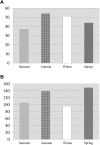Importance of cervicogenic general dizziness
- PMID: 29875897
- PMCID: PMC5981019
- DOI: 10.2185/jrm.2958
Importance of cervicogenic general dizziness
Abstract
A 15-month retrospective study of 1,000 outpatients was conducted to determine the exact cause of general dizziness. The most common diagnosis in all analyzed cases was cervicogenic general dizziness (89%). The majority of the patients who underwent magnetic resonance imaging of the cervical spine had narrow spinal canals. Measuring the anteroposterior diameter of the spinal canal in each case was critical to obtain an accurate diagnosis in line with the diagnostic criteria used. General dizziness may develop because of inappropriate neck posture over long periods of time in individuals with some form of underlying cervical disease. The causes of general dizziness were different between male and female patients and between patients of different age groups. Triggers leading to general dizziness included engaging in farming, gardening, or weeding activities for long periods of time, particularly in elderly women. Selection of the appropriate muscle relaxant type and dosage is important in the treatment of patients with cervicogenic general dizziness who also experience a stiff neck and shoulders. Following treatment, 90% of patients no longer experienced general dizziness or exhibited clear improvements in their symptoms within 1 week. The results of this study emphasize the importance of cervicogenic general dizziness, which is due to cervical vertebral lesions and is exacerbated by excessive stress on the cervical spine.
Keywords: cervicogenic; general dizziness; muscle relaxants; narrow spinal canal.
Figures









References
-
- Komatsuzaki A. Cervicogenic dizziness. Materials for the standardization of the vertigo diagnostic criteria – Report of the Vertigo Diagnostic Standardization Committee. “Keiseimemai. Memai shindan kijun-ka no tame no shiryō — 1987-nen memai shindan kijun-ka iinkai tōshin-sho. Equilibrium Res (Suppl.) 1995; 11: 54.(in Japanese).
-
- Kondo A.Cervicogenic dizziness. Diagnosis and treatment. Neurosurgery Bulletin Keiseimemai-shindan to chiryo. Noshinkei geka shokuho 2009; 19: 203––207. (in Japanese).
-
- Futaki T. Vertigo: Diagnosis and treatment approaches. Memai no mi-kata kangae-kata Igaku Shoin, 2001. (in Japanese).
-
- Barre JA. Surun syndrome symphathique cervical posterieure et sa cause frequente: I’arthrite cervicale. Rev Neurol 1926; 45: 1246–1248.
LinkOut - more resources
Full Text Sources
Other Literature Sources
